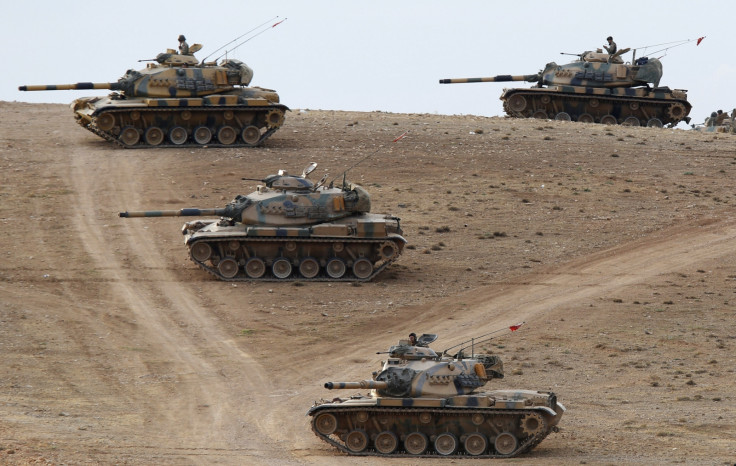War on Isis: Turkey's downing of Russian jet Su-24 betrays Erdogan's schizophrenic policy on Syria

Turkey's shooting down of a Russian military jet in northern Syria clearly marks a dangerous new phase of Turkish involvement in the Syria crisis – but it equally betrays Turkish President Recep Tayyip Erdogan's always controversial and at times schizophrenic policy towards the civil war raging over its southern border.
Much will be made of the fact that a Nato member now appears to have shot down a Russian plane, but neither Moscow or Ankara are likely to want the situation to escalate. Russia and Turkey may be on opposite sides over Syria – the former backing Bashar al-Assad and the latter a very specific alignment of militias seeking his overthrow – but neither are seeking direct conflict. One imagines (or indeed, hopes) that right now, frantic calls between other Nato members, Turkey and Russia are taking place to prevent just that.
What the incident does represent is Turkey's confused policy towards Syria: an early backer of groups such as the Free Syrian Army, Ankara has had its cards on the table with regard to Assad for over four years. As the conflict has become more complex, Turkey has funded a range of militias that are fighting Assad, including the Turkoman forces in northern Syria that are believed to have captured at least one of the Russian pilots.
Critics also accuse Turkey of not only turning a blind eye to the rise of Islamic State (Isis) in northern Syria but actively encouraging them, allowing weapons and foreign fighters to cross the border and oil and antiquities to come the other way, boosting both IS coffers and its military ranks. At the same time, Turkey's proximity to IS-held areas has been demonstrated by a series of devastating terrorist attacks in 2015 by IS affiliates.
The quagmire is only worsened by Turkey's policies towards Syria's Kurds, represented by the Kurdistan Workers Party (PKK)-affiliated People's Protection Units (YPG).
Turkey has watched with horror as an emboldened YPG has fought back IS, capturing key cities and furthering the Kurdish cause for independence in northern Syria. Ankara looks to its own restive Kurdish population and worries about that momentum echoing over the border.
As a result, Syria has seen the perverse situation in which Turkey has bombed both IS and the Kurds that are fighting them in both Syria and northern Iraq, where the exiled leadership of the PKK are based.
Ankara's call for a buffer zone in northern Syria is widely considered to be an attempt to restrict the Kurds as much as IS.
Enter Russia on the side of Assad and the complexity of Turkey's involvement in the conflict has been ramped up another notch. With Russian military backing, Assad is gaining momentum in Syria and Moscow's military campaign is not just targeting IS but various anti-Assad militias, some of which are backed by Ankara. Make no mistake, Turkey and Russia are at war in Syria – if only through their proxies.
Both sides will likely try to play down the incident and whether it intensifies will probably rely on the fate of the two pilots. If they are released or handed back to Russia, then the Russian public could probably forgive the incident; but if not things could get very sticky between Erdogan and Vladimir Putin. This is not the first time that Russia has been accused of violating Turkish airspace and as the military campaign intensifies it may not be the last.
As for the international response, Russia has few friends in the West in its efforts to prop up Assad despite his litany of crimes against Syrian civilians, while international coalition partners are equally frustrated with Turkey for first enabling IS and then attacking the US-backed Kurds that are fighting them. Due to their proximity and influence, the coalition cannot live without both Russia and Turkey in ending the war in Syria – sadly, recent events suggest that it can't live with them either.
© Copyright IBTimes 2024. All rights reserved.






